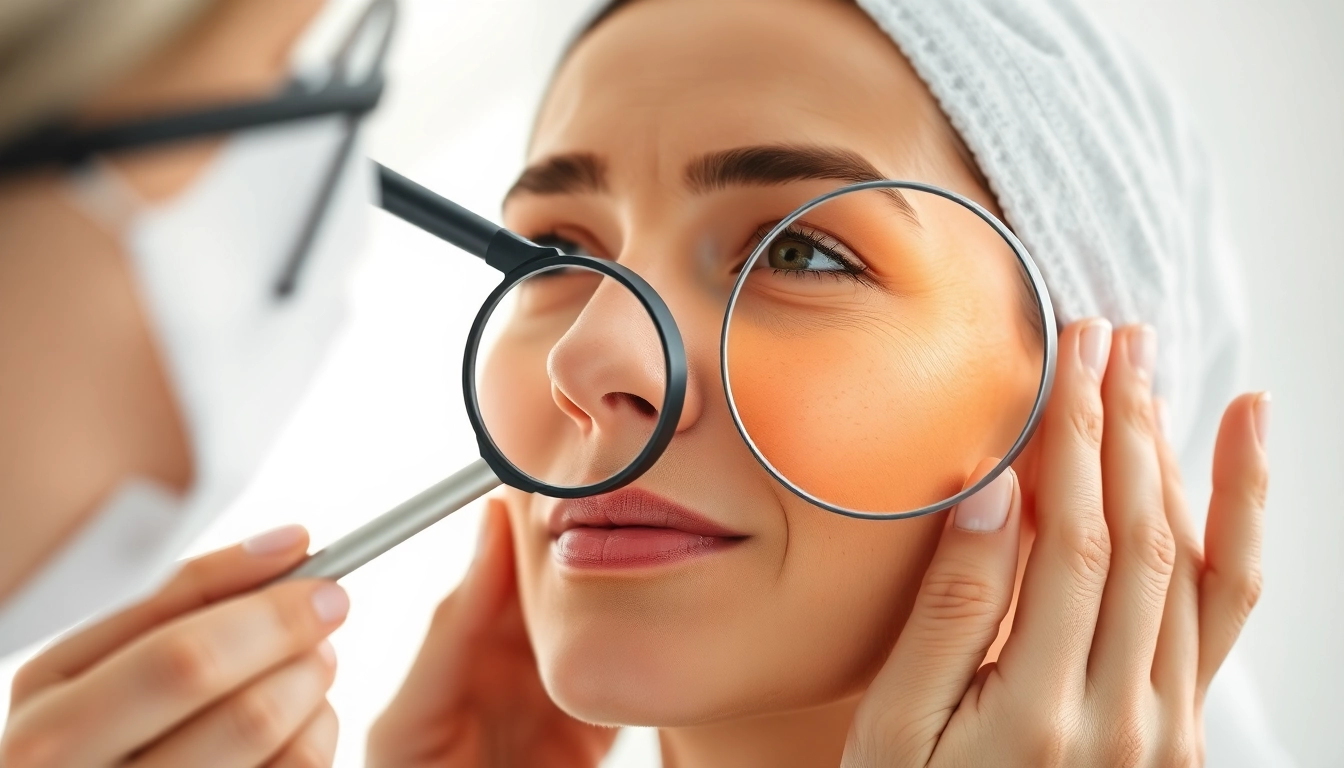Understanding Aesthetic Skin Concerns
Aesthetic skin concerns are common issues that affect many individuals, often impacting their self-image and overall confidence. These concerns can range from acne to pigmentation issues and signs of aging. Understanding these concerns is crucial, not just for cosmetic reasons but also for overall skin health. The realm of aesthetic skin concerns encompasses a variety of dermatological issues and can provide insights into an individual’s health and wellbeing. In this article, we will explore the definition of these concerns, common types, their impacts on self-esteem, and more.
Defining Aesthetic Skin Concerns
Aesthetic skin concerns refer to various skin issues that affect the appearance, texture, and tone of the skin. While not always indicative of serious medical problems, these concerns can significantly influence how individuals perceive themselves. For example, skin conditions like eczema or rosacea can cause substantial discomfort and may also carry aesthetic implications such as redness or irritation. These concerns often push individuals to seek treatments, whether topical solutions, professional procedures, or lifestyle changes.
Common Types of Aesthetic Skin Concerns
Several aesthetic skin concerns are prevalent and can vary in severity. The following are some of the most common:
- Acne: A frustrating issue for many, acne can manifest as pimples, cysts, and scars.
- Hyperpigmentation: Patches of skin that are darker than the surrounding area, often caused by sun exposure or hormonal changes.
- Wrinkles and Fine Lines: Natural signs of aging that can make individuals appear older than they are.
- Rosacea: A chronic inflammatory condition leading to facial redness, sometimes accompanied by visible blood vessels.
- Dryness or Dehydration: Lack of moisture can lead to a rough texture and visible flaking.
- Uneven Skin Tone: Can result from a variety of factors such as sun damage or hormonal fluctuations.
Impact of Aesthetic Skin Concerns on Self-Esteem
The correlation between skin health and self-esteem is documented in numerous studies. Individuals with visible skin concerns often report feelings of embarrassment and anxiety, which can inhibit social interactions and lead to low self-esteem. The impact is profound; for many, feeling comfortable in their skin can lead to greater participation in social activities, professional endeavors, and personal relationships. Addressing these aesthetic concerns, therefore, isn’t just about appearance but fundamentally about enhancing quality of life.
Identifying the Causes of Aesthetic Skin Concerns
Understanding the root causes of aesthetic skin concerns is essential for effective intervention and treatment. The factors contributing to these concerns can be diverse and interrelated, encompassing genetic, environmental, and lifestyle influences.
Genetic Factors
Genetics play a significant role in determining an individual’s susceptibility to various skin conditions. Research shows that a family history of certain skin concerns can increase one’s likelihood of experiencing similar issues. Conditions such as acne, eczema, and psoriasis often have hereditary components. Understanding one’s family health history can provide insights into potential skin health interventions.
Environmental Influences
The environment can also significantly affect skin health. Factors such as pollution, climate, and even lifestyle choices can exacerbate existing skin concerns. For example, urban areas with high pollution levels may see higher instances of skin issues due to environmental stressors. Moreover, UV exposure from the sun is a well-known contributor to premature aging and various skin concerns. Protective measures like sunscreen and appropriate clothing can mitigate these influences.
Diet and Lifestyle Choices
Diet plays a critical role in skin health, with certain foods promoting a healthy complexion while others contribute to problems like acne or dryness. Diets high in sugars and unhealthy fats can lead to inflammatory skin conditions, while a diet rich in vitamins A, C, E, and omega fatty acids can enhance overall skin health. Hydration is equally important—insufficient water intake can lead to dry, flaky skin. Lifestyle choices such as smoking and excessive alcohol consumption can also detract from skin vitality, making it crucial for individuals to adopt healthy habits for sustained skin health.
Effective Treatments for Aesthetic Skin Concerns
Treating aesthetic skin concerns involves a multi-faceted approach that may include topical solutions, professional interventions, and home remedies. The type of treatment chosen can depend on the individual’s skin type, the severity of the concern, and personal preferences.
Topical Solutions
Topical treatments are often the first line of defense against various skin concerns. These can include:
- Retinoids: Effective in treating acne and reducing signs of aging by promoting cell turnover and increasing collagen production.
- Hydroquinone: Used to lighten hyperpigmentation and even out skin tone.
- Moisturizers: Vital for combatting dryness and maintaining skin hydration.
- Exfoliants: Products containing alpha or beta hydroxy acids help slough off dead skin cells, promoting a smoother texture.
Professional Procedures
For individuals seeking more immediate or drastic results, professional treatments can offer significant benefits. These may include:
- Laser Therapy: Effective in treating pigmentation issues and acne scars, delivering results through targeted light energy.
- Microneedling: Involves using tiny needles to create micro-injuries in the skin to stimulate collagen production, aiding in the treatment of wrinkles and scars.
- Chemical Peels: Designed to exfoliate the top layers of skin, improving texture and tone.
- Injectables: Fillers and Botox are popular options for reducing fine lines and enhancing facial volume.
Home Remedies and Their Effectiveness
While professional treatments and topical solutions are prevalent, many individuals turn to home remedies for skin care. These remedies can range from using honey for its antibacterial properties to applying aloe vera for its soothing effects. While some home remedies do provide benefits, it’s essential to conduct thorough research on their effectiveness and potential risks. Moreover, what works for one individual may not work for another, making it crucial to monitor the skin’s response when trying new remedies.
Preventing Aesthetic Skin Concerns
Prevention is often more effective and less costly than treatment. Establishing a consistent skincare routine and making informed lifestyle choices can help reduce the risk of developing aesthetic skin concerns.
Skincare Regimens for Healthy Skin
An effective skincare regimen is fundamental to maintaining healthy skin. This should include:
- Daily Cleansing: Choosing a gentle cleanser suitable for your skin type helps remove dirt and impurities without striping the skin of its natural oils.
- Sun Protection: Applying a broad-spectrum sunscreen daily is crucial to protect against UV damage.
- Moisturization: Nourishing the skin with appropriate moisturizers can prevent dryness and maintain a healthy barrier.
- Regular Exfoliation: This helps remove dead skin cells, encouraging cell turnover and a fresh appearance.
Role of Nutrition in Skin Health
A well-balanced diet rich in fruits, vegetables, lean proteins, and healthy fats can have a profound impact on skin health. Antioxidants found in fruits and vegetables play a significant role in combating oxidative stress that can lead to premature aging. Incorporating omega-3 fatty acids from sources like fish and flaxseeds can also improve skin hydration and elasticity. Staying hydrated by drinking ample water is equally important, as it supports overall skin function and encourages a fresh appearance.
Safeguarding Against Environmental Damage
Environmental factors such as pollution, UV radiation, and extreme weather conditions can negatively affect the skin. Safeguarding against these elements includes wearing protective clothing, using sunscreen diligently, and considering antioxidant-rich skincare products to counteract environmental damage. Furthermore, maintaining a healthy indoor environment with air purification can minimize the harmful effects of pollutants.
Measuring Success in Treating Aesthetic Skin Concerns
Implementing treatments for aesthetic skin concerns requires time and patience. Understanding how to measure success is crucial for ensuring that the treatment plans are effective and appropriate adjustments are made as needed.
Setting Realistic Expectations
Setting realistic expectations is essential. Individuals should understand that results may vary depending on factors such as skin type, age, and the specific concern being treated. Educating oneself about the typical timeline for improvement and what to anticipate can help reduce dissatisfaction and improve treatment adherence.
Adjusting Treatment Plans Based on Results
Regularly assessing the effectiveness of treatment is vital for making necessary adjustments. Individuals should keep track of their progress, noting any improvements or adverse reactions. This allows for informed decisions on whether to continue, modify, or switch treatment methods based on observed results. Consulting with skincare professionals can provide additional insights and recommendations during this evaluation phase.
Long-Term Care and Maintenance Strategies
Long-term maintenance is vital for sustaining results achieved through treatment. Individuals should continue with a diligent skincare routine even after achieving desired effects, as this helps preserve skin health and prevents the recurrence of concerns. Regular check-ups with dermatologists or skin care professionals can be instrumental in adapting skincare strategies to ongoing environmental changes and personal skin responses.























+ There are no comments
Add yours